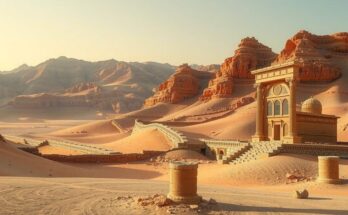The increasing aggression of M23 rebels in the DRC, reportedly backed by Rwanda, raises alarms reminiscent of the past Congo wars. As Uganda deploys troops to combat other factions, analysts express concern over a potential regional conflict. The ongoing crisis demands urgent dialogue and reforms to address deep-rooted issues and ensure the safety and stability of the Congolese people.
In the Democratic Republic of the Congo (DRC), rising tensions have resulted in communities bracing for conflict or fleeing the advancing M23 rebels. This group, allegedly supported by Rwanda, has recently seized significant cities such as Goma and Bukavu, while also threatening Walikale, an important mining area. Despite the DRC government offering a $5 million reward for the capture of M23 leaders, the group’s progress remains unabated.
As M23 insurgents continue their campaign in North and South Kivu, the Ugandan military has increased deployments near the DRC, specifically in Ituri province. The Ugandan forces aim to combat the Allied Democratic Forces (ADF) and the Cooperative for the Development of Congo (CODECO). Recent CODECO attacks resulted in at least 51 civilian fatalities, prompting Uganda to bolster its military presence, which now totals over 5,000 troops in the DRC.
Political analysts warn that the resurgence of Rwandan and Ugandan troops in this region evokes memories of past conflicts. Paul Nantulya from the Africa Center for Strategic Studies remarked, “We are indeed seeing a replica of the Second Congo War with the same actors but in slightly different configurations,” referencing the events of the 1998 Great African War, which involved multiple nations and led to a prolonged humanitarian crisis.
The historical context reveals that conflicts in the DRC have persisted for over three decades, causing more than six million deaths and displacing millions. The causes of unrest include grievances held by Rwanda regarding DRC sheltering anti-Rwandan rebels and regional competitions over mineral wealth, compounded by persistent governmental corruption.
Rwanda and Uganda’s interventions in the DRC have their roots in the aftermath of the Hutu genocide, triggering both the First and Second Congo Wars from 1996 to 2003. Following the ousting of former President Mobutu Sese Seko, Laurent Kabila gained power but quickly alienated his once-allied invading forces, leading to renewed conflicts that drew in multiple African nations.
Since the official end of the Congo wars in 2003, violence has not ceased, as Rwanda and Uganda have faced accusations of human rights violations and resource exploitation. Reports indicated that prominent figures, including members of the Ugandan leadership, were involved in illicit resource trading, which contributed to sustained conflict and personal enrichment.
In 2022, the International Court of Justice held Uganda liable for its actions during the wars, ordering them to pay compensation, while ongoing legal cases against Rwanda remain unresolved. The DRC continues to face interference from its neighbors, notably with rebel leader Corneille Nangaa now posing a threat to Kinshasa as he aligns with M23.
Some experts assert that external intervention has never truly ceased. Current involvement includes Rwanda allegedly backing M23 forces, while Uganda maintains a complicated position in the conflict, navigating between support for the DRC government and interactions with M23.
The DRC’s rich mineral resources remain a central battlefield, with illegal mining operations contributing significant funding to M23’s activities. Analysts estimate that they generate approximately $800,000 monthly from illegal gold sales. Enhancing diplomatic pressures for negotiations among regional players and addressing the DRC government’s internal issues are essential for conflict resolution.
International observers note that the DRC requires substantial support from both African nations and global powers to address its systemic challenges. This includes fostering legitimate governance and ameliorating the plight of marginalized communities, particularly Congolese Tutsis.
Recently, calls for national dialogue and peace talks are seen as hopeful developments. The visit from the International Criminal Court prosecutor, Karim Khan, highlights the need for accountability for all sides in the conflict. As Kambale Musavuli poignantly stated, “The people of the Congo have to be alive so that they can rebuild the country for the benefit of the African continent. That’s why DRC needs a break. Not just for themselves, but for the entire African continent.”
The escalating conflict in the DRC, fueled by the advances of M23 rebels and historical regional dynamics involving Rwanda and Uganda, underscores the urgent need for international and regional intervention. Analysts draw parallels to the past atrocities during the Congo wars, emphasizing the critical requirement for a comprehensive approach to dialogue and reform. With the DRC’s rich resources at stake, ensuring stability and addressing internal challenges are paramount for the future of the nation and the wider African continent.
Original Source: www.aljazeera.com




